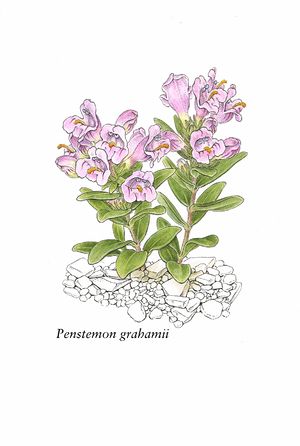Difference between revisions of "Penstemon grahamii"
Ann. Carnegie Mus. 26: 331. 1937. (as grahami)
imported>Volume Importer |
imported>Volume Importer |
||
| Line 6: | Line 6: | ||
|place=26: 331. 1937 | |place=26: 331. 1937 | ||
|year=1937 | |year=1937 | ||
| + | |other_info_on_pub=(as grahami) | ||
}} | }} | ||
|common_names=Graham’s or Uinta Basin beardtongue | |common_names=Graham’s or Uinta Basin beardtongue | ||
| Line 54: | Line 55: | ||
|publication year=1937 | |publication year=1937 | ||
|special status=Endemic;Conservation concern | |special status=Endemic;Conservation concern | ||
| − | |source xml=https:// | + | |source xml=https://bitbucket.org/aafc-mbb/fna-data-curation/src/2e0870ddd59836b60bcf96646a41e87ea5a5943a/coarse_grained_fna_xml/V17/V17_351.xml |
|genus=Penstemon | |genus=Penstemon | ||
|subgenus=Penstemon subg. Penstemon | |subgenus=Penstemon subg. Penstemon | ||
Latest revision as of 19:31, 5 November 2020
Stems ascending to erect, 7–18 cm, retrorsely hairy. Leaves basal and cauline, or basal absent or reduced, leathery, glabrous or distal cauline sometimes glandular-pubescent along margins and midvein; basal and proximal cauline petiolate, 16–50 × 5–20 mm, blade oval to elliptic, base tapered, margins entire, apex rounded to obtuse; cauline 2 or 3 pairs, sessile or proximals short-petiolate, 25–48 × 6–15 mm, blade oblanceolate to elliptic or lanceolate, base tapered to clasping, margins entire or obscurely serrate distally, apex obtuse to acute. Thyrses continuous, cylindric, 4–7 cm, axis glandular-pubescent, verticillasters 4–6, cymes 2–6-flowered, 2 per node; proximal bracts lanceolate, 26–36 × 5–12 mm; peduncles and pedicels glandular-pubescent. Flowers: calyx lobes lanceolate, 6.2–9 × 1.7–2 mm, glandular-pubescent; corolla lavender to pink, with violet nectar guides, ventricose-ampliate, 28–35 mm, sparsely white-lanate internally abaxially, tube 9–13 mm, throat abruptly inflated, prominently constricted at orifice, 11–15 mm diam., rounded abaxially; stamens: longer pair reaching orifice or exserted, pollen sacs opposite, explanate, 0.9–1.4 mm, dehiscing completely, sutures smooth; staminode 17–20 mm, prominently exserted, 0.3–0.5 mm diam., tip recurved to coiled, distal 13–16 mm densely pilose, hairs golden yellow or orange, to 0.8 mm; style 21–24 mm. Capsules 8–10 × 5–6 mm.
Phenology: Flowering May–Jun.
Habitat: Talus slopes, benches, knolls, washes in desert shrublands, pinyon-juniper woodlands.
Elevation: 1400–2000 m.
Discussion
Penstemon grahamii is known from the Uinta Basin. Populations have been documented from Raven Ridge in extreme northwestern Rio Blanco County, Colorado (S. L. O’Kane 1988), south and west in an arc across southern Uintah County, Utah, into extreme northeastern Carbon County and extreme southeastern Duchesne County. Plants grow in loose shale and shale-derived soils associated with the Green River Formation.
Selected References
None.
